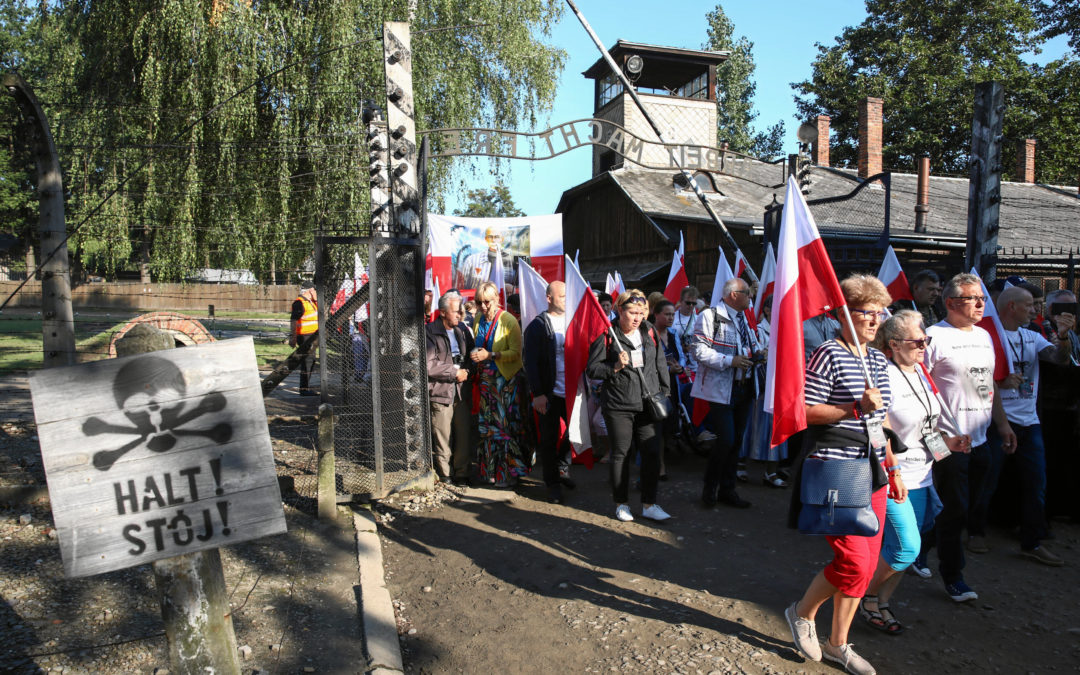Poles are more likely to see Auschwitz as a site of Polish martyrdom than of the destruction of Jews, finds a new study, which also reveals significant gaps in public knowledge about the history of the former German Nazi camp.
The findings stem from a survey conducted by Kantar, a research company, as part of a project on Polish social memory of Auschwitz run by sociologists at the Jagiellonian University in Kraków and financed by the National Science Centre (NCN), a Polish state body for funding academic research.
When asked what they most associate Auschwitz with, around half of respondents in the poll (49.8%) said “the martyrdom of the Polish nation”. This was higher than the proportion (42.6%) whose primary association was “the destruction of the Jews”.
Professor Marek Kucia, who is leading the research project, told Gazeta Wyborcza that these proportions have shifted in recent times. A decade ago, he notes, more Poles associated Auschwitz with the destruction of Jews (who made up 90% of the camp’s victims) than with Polish martyrdom.
Kucia ascribes the change to “the influence of the political narrative which has been strengthening in recent years, emphasising that Poles were victims of the war”. Poland’s ruling Law and Justice (PiS) party, in power since 2015, has pursued an assertive historical policy that focuses on Polish victimhood.
Prime Minister Mateusz Morawiecki recently hailed the success of his government’s “decisive struggle for historical truth”, noting that Germany’s president and chancellor had both “emphasised German guilt and German crimes” during visits to Poland.
Other research has shown that Polish perceptions of Auschwitz, the Holocaust and World War Two have been shifting over a much longer period, with a growing trend to regard Polish and Jewish victimhood as equal, or even to see the former as greater.
Surveys conducted by sociologist Ireneusz Krzemiński have found that the proportion of the public who think that Poles suffered as much as Jews during the war increased from 39% in 1992 to 62% in 2012. Over the same period, those who thought that Jews suffered the most fell from 46% to 32%, while those believing that Poles suffered the most rose from 6% to 16%.
The new Kantar/Jagiellonian University poll also highlights the prominent role in Polish collective consciousness played by Auschwitz, which was initially established by the Germans occupiers to house Polish “political prisoners” and at which ethnic Poles were numerically the second largest group of victims, after Jews.
Just under 94% of respondents in the poll said that memory of the camp is important to them. When asked to pick what they most associate with the Second World War, the top answers chosen from a list were the German invasion of 1939 and Auschwitz, with 29.2% and 28.7% respectively. The Warsaw Uprising (15.8%) and the Katyń massacres (6.7%) were third and fourth.
Around half of respondents (50.4%) said they had visited the site of the former camp, which is now a museum, including 11.9% who had been more than once.
Yet despite this, very few Poles were able to correctly identify the number of victims of the camp. Two thirds admitted they did not know. Only 10.7% chose a figure within the correct estimated range of 1.0-1.5 million.
Most of the remainder overestimated the figure, including 11.6% who put it above 3 million. The confusion may be explained by the fact that for decades after the war, Poland’s communist authorities – including at the Auschwitz state museum itself – claimed that 4 million had died there.
When asked which ethnic group was the primary victim of Auschwitz – and offered a choice of Roma, Poles, Hungarians and Jews – only 54.9% of respondents correctly identified Jews. Almost a quarter (23.7%) wrongly named Poles as the biggest victims.
In fact, around one million Jews (including 300,000 Polish Jews) were murdered at the camp, compared to around 70,000 ethnic Poles. Among Jews transported to Auschwitz, only 10% survived. Among Polish inmates, 54% did.
The polling was carried out by Kantar on behalf of Professor Marek Kucia using a nationwide randomised sample of 1,015 respondents aged 15 or above and representative of the population of the country.
Main image credit: Jakub Porzycki/Agencja Gazeta

Daniel Tilles is editor-in-chief of Notes from Poland. He has written on Polish affairs for a wide range of publications, including Foreign Policy, POLITICO Europe, EUobserver and Dziennik Gazeta Prawna.




















